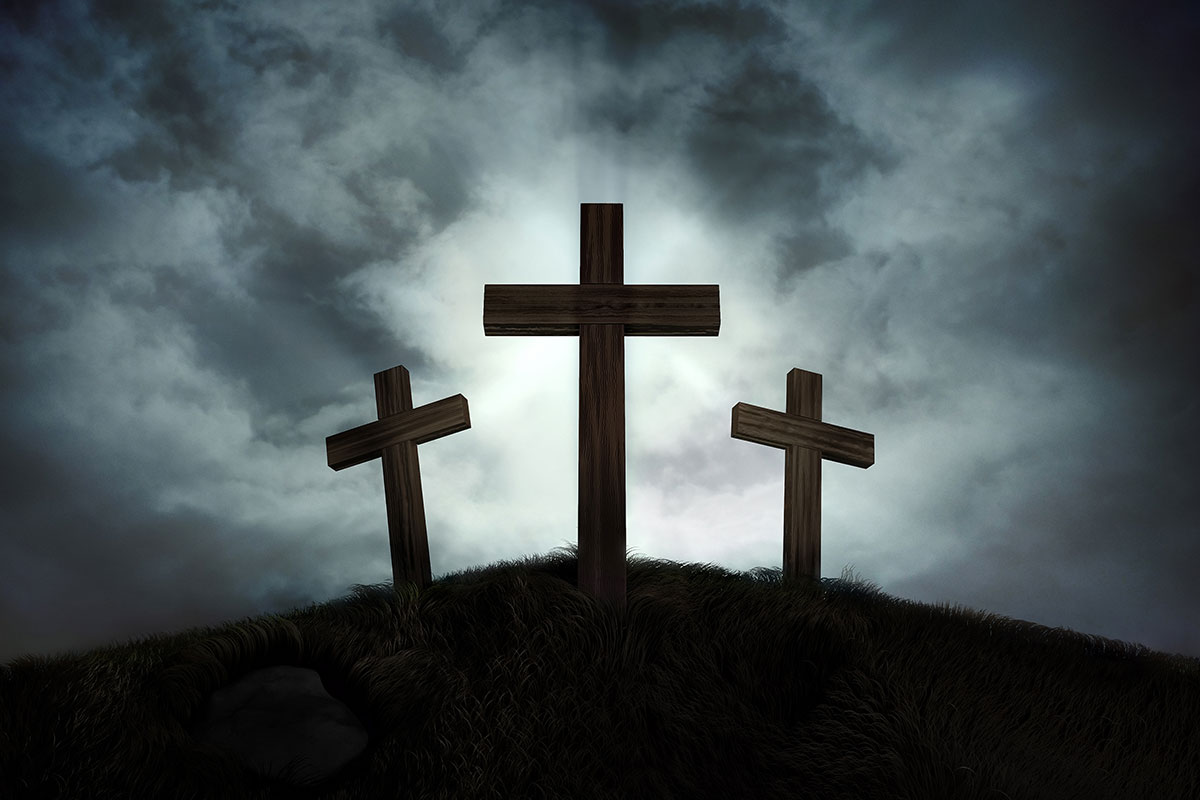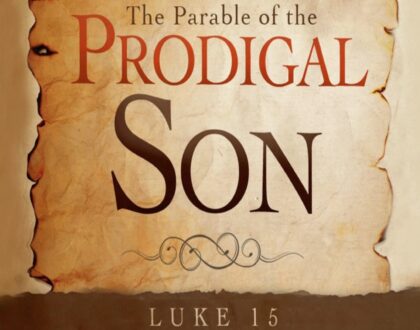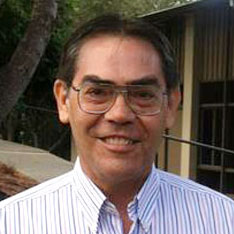The Power of God’s Word

Luke 8:26-39
Then [Jesus and his disciples] arrived at the country of the Gerasenes, which is opposite Galilee. As he stepped out on land, a man of the city who had demons met him. For a long time he had worn no clothes, and he did not live in a house but in the tombs. When he saw Jesus, he fell down before him and shouted at the top of his voice. “What have you to do with me, Jesus, Son of the Most High God? I beg you, do not torment me”—for Jesus had commanded the unclean spirit to come out of the man. (For many times it had seized him; he was kept under guard and bound with chains and shackles, but he would break the bonds and be driven by the demon into the wilds.) Jesus then asked him, “What is your name?” He said, “Legion,” for many demons had entered him. They begged him not to order them to go back into the abyss. Now there on the hillside a large herd of swine was feeding, and the demons begged Jesus to let them enter these. So he gave them permission. Then the demons came out of the man and entered the swine, and the herd rushed down the steep bank into the lake and was drowned. When the swineherds saw what had happened, they ran off and told it in the city and in the country. Then people came out to see what had happened, and when they came to Jesus, they found the man from whom the demons had gone sitting at the feet of Jesus, clothed and in his right mind. And they were afraid. Those who had seen it told them how the one who had been possessed by demons had been healed. Then all the people of the surrounding country of the Gerasenes asked Jesus to leave them for they were seized with great fear. So he got into the boat and returned. The man from whom the demons had gone begged that he might be with him, but Jesus sent him away, saying, “Return to your home, and declare how much God has done for you.” So he went away, proclaiming throughout the city how much Jesus had done for him.
The Power of God’s Word
I have always loved this story because of what it tells us about the power of God’s word. Many people who read this story today might find it puzzling to say the least. After all, we don’t believe in the existence of demons any more. Our worldview and our assumptions of what is real and what isn’t exclude the existence of entities that can’t be identified or detected through disciplined research. The notion of a “demon,” a purely spiritual entity that has no body of its own, is undetectable by definition. Even if it were present, it would be impossible to see it. Therefore, if the basic facts of the story were true, then we would have to conclude that this person had some kind of mental or neurological disorder. We might add that people in Jesus’ day and age didn’t understand such things, and so, they came up with this demon theory.
Sounds reasonable on the surface. However, this would be a classic case of imposing our worldview on the text. This is not exegesis (interpreting the meaning of the text); it is isogesis (imposing our assumptions about what is real and what isn’t on the text. Moreover, this completely misses the point. Whether you call this man’s affliction a mental disorder or demon possession, it is for all intents and purposes beside the point. The fact is that this man was powerless over whatever caused his madness. Whether it was an alien presence, or a brain disease, he was out of control. His behavior was caused by something that took control over him and neither he nor anyone else could do anything about it. This idea that we understand reality better than people in the ancient world has lead to a situation where the very concept of “evil” is no longer taken seriously. I might say at this point that “evil” is a concept that refers to a power of negativity out of our control. “Evil” happens when a power, or a person under an alien power of some kind, is bent on destruction and ultimately death. Goodness builds up. It enhances life and makes the conditions of life better. When we see acts of kindness, compassion, and mercy, we see goodness. When we see destruction, chaos, and death, we see evil. Philosophers call evil “the power of non-being” because evil results in the destruction of life and all that makes life possible. Evil leads to nothingness—to what the demons in this story call “the abyss.”
My point here is that this concept—evil—is no longer taken very seriously, or even used, because it doesn’t fit in very well with the way we understand people or events that cause terrible things to happen. For example, the debates on gun violence have wandered off to the area of how well we deal with mental health. It seems to me that there is the assumption that perpetrators of gun violence must have a mental disorder or they wouldn’t do what they did. Anyone who shoots innocent people is automatically considered to be a candidate for the department of psychiatry. ”Perhaps if the perpetrator had the right form of medication, he wouldn’t have done it.”
Personally, I think this assumption is dangerous. First, it stigmatizes people with mental health concerns. The percentage of people with mental disorder who become violent perpetrators is probably below that of the average. Secondly, this overlooks the fact that the vast majority of violent and destructive behavior comes from people who are not only sane, but also sometimes ingenious in their calculated way of doing so. What about those who belong to ISIS? What about Jonestown? Were all the Germans who participated in the Holocaust candidates for psychotherapy? The same goes for Stalin’s Russia and the regime in North Korea.
What those people did, and what some continue to do, is evil. It destroyed countless lives and resulted in suffering on an incalculable scale. So, while we might want to exclude the demon theory, we’re still left with the incomprehensible fact that its presence in human behavior does not easily lend itself to any particular worldview.
In any case, however we might want to try to understand the behavior of the character in this text, he was clearly under the influence of a power of evil. He broke every social norm in the book. He wore no clothes. He was driven into the “wilds.” He couldn’t be controlled, even by chains. And this is the key observation: he lived “… in the tombs.” In other words, he felt at home with death. It was among the dead that he lived—not the living, because evil causes death, not life.
The people in this community were Gentiles—and this is also a key observation, namely, that Jesus ministered to Gentiles; that is very odd. The Jewish Messiah, sent to fulfill promises given to his Hebrew ancestors, completely breaks the mold of what is expected. “Wasn’t the Messiah’s job to restore the people of Israel? How is it that he crosses the Galilean border into the area called the Decapolis—an area known to be inhabited by people of Greek and Roman culture—so as to bring the Jewish Gospel to them?” Clearly, Jesus understood that his mission was to bring the influence of God’s kingdom to earth; he understood that the power of God’s Word to transform and change human life for the good also belonged to Gentiles. In other words, Jesus is the fulfillment of the promise given to Abraham, that through him, all the people of the earth would be blessed. But it’s also important to understand that Jesus’ outreach to Gentiles would have caused a huge controversy. He broke all the laws, norms, expectations, and assumptions concerning what the Messiah would do. People could not understand him. “Who is this person?” was asked again and again. He didn’t fit into any predetermined mold. In him, God’s Kingdom came near, and its powerful influence extended beyond the borders of Israel and into all the earth.
As I was saying, the people in this Greek community had become accustomed to the presence of this wild madman. While they couldn’t entirely control him, they did their best to keep him at arm’s length. Just as a person might get used to the symptoms of a physical disorder, or just as a community might get used to an odd resident, they may not like it, but they have learned to live with it. So it was here. This reminds me of a particular area in my hometown. Confined to this one sub-community were all the prostitution, alcohol and drug abuse, and criminal behavior. The people of the town didn’t like it, but they were able to confine most of it to this one area. They got accustomed to the presence of these nefarious influences by pushing them off to one side and confining them. This is a common practice everywhere.
When Jesus steps out of the boat, who is there to greet him? Not the respectable residents of the community. They don’t want their boat to be rocked in any way. They like it as it is. So the welcoming person is none other than this man who is completely under the control of an evil and alien influence. However, we may want to understand the presence of this evil—and that’s really beside the point. What is relevant is that this evil is afraid of Jesus. “I beg you, do not torment me…”
The presence of evil in our communities and in our lives casts a shadow over us that is hard to deal with. We don’t want to talk about it because it can cause shame, and we don’t know how to deal with it because its power is out of our control. The war on drugs is a good example. The sex-slave industry, prostitution, and alcohol abuse: these things don’t go away because our efforts to stamp them out don’t work. While it’s very important to confront and deal with these things because they destroy lives and result in enormous suffering for individuals, families, and communities; nevertheless, it seems as if we can do no more than to push them off to the side, to confine them as this community confined the demon-possessed man. Despite our efforts to call these life-destroying influences what they are –evil—nevertheless, they are present and it seems as if we are unable to deal with them despite our best effort.
There was once a close-knit family who lived with a terrible secret. One of the sisters in this otherwise well-functioning family was married to an alcoholic wife-beater. He reached out for help and support because he was literally destroying her life. But divorce in this community was unthinkable. It would have caused great shame for everyone, especially her parents. So they urged her to stay in the marriage. They also talked to the husband and tried to change his behavior, but to no avail. She eventually was driven into madness; schizophrenia was the diagnosis, and she became a ward of the state, living in a home for those who couldn’t be helped. Her son suffered the same fate. The influence of this alcoholic wife-beater was evil, and it destroyed his life as well as that of his wife and son.
Getting back to our story. The evil influence on this man is said to recognize Jesus and the greater power of God’s Kingdom—the power of love, goodness, and life. This is what God’s Word in Jesus Christ gives. There is no place for evil in God’s Kingdom. As Luther emphasized, God’s Kingdom is ruled through the power of God’s Spirit. That power changes and transforms lives. Evil influences are not pushed off to the side, kept under wraps, and confined. In God’s Kingdom, people don’t have to learn how to live with evil influences or become accustomed to them. The gift of God’s Spirit of love overcomes the power of negative and evil influences. Instead, it gives life; it gives healing.
What this story tells us about Jesus is twofold. First, it assures us of Jesus’ presence in our lives no matter where we are or no matter what dark influences we may be dealing with. It’s amazing that Jesus leaves the comfortable confines of his Jewish homeland and ventures off to a land so completely different from his own. And not only that, but for Jews, a burial gown was considered ritually unclean. Unless they had to bury a lost loved one, Jews at this time stayed away from cemeteries. And why does Jesus go there if not to restore and raise up this man who was entirely lost because of the evil influences that had taken over his life?
God is present in those areas and at those times when we are most in need of him and his power to overcome darkness. When we are grieving and feel as if we can’t go on, God is present. Should we ever feel abandoned because events and circumstances have overcome our ability to deal with them, God is present. Whenever we feel Godforsaken in the midst of an illness, or when our lives seem chaotic or out of control, God is present. Or, whenever events in our world make it seem as if evils around us have gained the upper hand, as I’m sure the people in Orlando might feel, God is present. There is no place in this world where God is not present.
And not only this, but God’s presence overcomes the influence of any spirit that drains our lives away—that makes us feel as if our lives—our spirits—are weak, broken, or entirely overcome. As Jesus, who brings the power of God’s life-giving love into our hearts, sought out this man who was completely overcome by evil spirits who took his life away from him, Jesus similarly seeks us out. This man is a clear example of the fact that we don’t have to go on a pilgrimage to find God. Rather, he seeks us out. He finds us. And he does so no matter what the circumstances of our lives might be. In the depths of our despair, Jesus seeks us out. And he does so no matter who we are or what our past has been.
This Gentile man who was living in the tombs would have been the last person anyone would have expected to be sought out by and found by Jesus who brought the power of God’s Kingdom to him. Think about it. This man, entirely under the influence of dark and evil spirits must have thought that he was lost and done for, just as people who are experiencing death and destruction around them often ask, “Where is God in all this?” I distinctly recall this question being asked on 9/11, when it seemed as if evil had gained the upper hand. For a time, it looked as if it did.
The answer is that God is in the midst of it; the Spirit of God does not flee when faced with evil. Rather, evil flees when confronted by God’s grace and love. Moreover, as this story illustrates, God’s grace and love are offered to everyone. As David Jose, professor of homiletics, put it, “There is no person who is God-forsaken. Unclean. Outcast. Abandoned. Unpopular. Incarcerated. Unbeliever. No one is left out.” If this is not testimony to the fact that God’s redeeming love is available to everyone no matter who they are, I don’t know what is! Salvation—being freed of the influences that bring despair and death is a gift of God’s grace. Through the Holy Spirit, Jesus Christ is present for us now and at any time. We need only lift our hearts to him so that he might restore, raise us up, and give us new life. There are no conditions to be met first. There is nothing we have to do to make us worthy of this gift. It comes to us for one reason—because God is love, and God wants us to experience the power of that love, a power that frees us from those things that cause despair, doubt, fear, and hopelessness.
This is the message of this text. It is honest in its portrayal of the destructive power of evil. And it is also honest in its portrayal of the power of God’s grace to overcome evil. The people of the town were uncomfortable with Jesus’ presence because he possessed a power they did not understand. They had grown accustomed to the presence of these demons, and they felt as if the situation was under control. Jesus’ presence introduces a power they could neither understand nor control, so they ask him to leave them alone. Better to live with negatives you have become accustomed to than with someone who has the ability to turn everything topsy-turvy.
The man understandably wants to stay with Jesus. But Jesus already has all the disciples he needs. However, now that this demoniac knows first hand what God can do when we turn to Him in faith, he is capable of being a witness to others. “Go and tell people what God has done for you!” This is how the powerful good news of Jesus Christ is spread. All it takes is people willing to tell their story—the story of what faith in God can do—how it has the power to overturn the influence of evil and its negative consequences: how it has the power to heal our spirits, to give us faith, hope, and love rather than fear, despair, and death. This also is our job. It is the only way in which the gospel spreads, and others are blessed with the gift of a healthy and vital spiritual life. There is no greater way in which we can make an impact for the good in the lives of others than to tell them what God has done for us.
Pastor Daniel Severson
Hope Evangelical Lutheran Church
San Mateo, California 94403
June 17, 2016
Recent Sermons

The Parable of the Prodigal Son
March 30, 2025

Getting Ready for the Kingdom
March 16, 2025

Identity Tests
March 09, 2025



